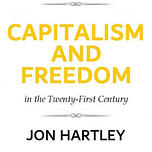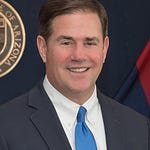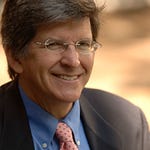Glenn Hubbard (Former White House CEA Chair and Columbia Business School Professor) joins the podcast to discuss his career in academia and government along with his views on tax policy, including the legacy of the Bush tax cuts and corporate tax reforms, the optimal features of consumption taxes, the current path of government spending and public debt as well as the political economy issues underlying the recent rise of populism.
Jon: “This is the Capitalism and Freedom in the 21st Century podcast, where we talk about economics, markets, and public policy. I'm Jon Hartley, your host. Today, I'm joined by Glenn Hubbard, who is the Russell Carson Professor of Finance and Economics and the Director of the Jerome Chazen Institute for Global Business at Columbia Business School, where he previously served as Dean. Glenn served as Chair of the White House Council of Economic Advisers under George W. Bush and previously served as Deputy Assistant Secretary of the Treasury under George H.W. Bush. Glenn has published numerous academic articles across many subfields in economics and is also the author of several books, including The Wall and the Bridge, Balance, The Aid Trap, and Healthy, Wealthy, and Wise. Glenn also serves on many corporate boards and is incredibly knowledgeable on all things economic policy-related and draws on years of experience in government and advising several presidential candidates. Welcome.”
Glenn: “Thanks. Thanks for having me.”
Jon: “Glenn, you grew up in Florida. You were an Eagle Scout. You graduated with two degrees and three years from UCF. You got your PhD in economics from Harvard before joining the faculty at Columbia. How did you first get interested in economics?”
Glenn: “Well, it's a great question. When I went to college, you mentioned UCF, University of Central Florida. When I started, it was actually called Florida Technological University. I went because I wanted to be an electrical engineer and it was the core of a lot of engineering work in Florida because of the space program, defense contractors, and so on. As I studied engineering, I realized I was more interested in people than an engineer might be. It turned out to be a good thing for me in the sense that all the math I took as an engineer made economics actually pretty easy. I was really blessed in college to have some extraordinary teachers who really turned me on to economics. The other two outside influences I had for economics was one was Alan Greenspan. Remember, I started college in the middle 1970s and Alan Greenspan had been President Ford's CEA Chair. He's not yet Fed Chairman at this point, but a super successful economic consultant, policy advisor. I thought, you know, I really like that. The other person that I admired a lot and ultimately went to graduate school to work with is Martin Feldstein, who sadly passed away a few years ago. Marty was one of the early champions of studying incentives in economics. People think of it as conservative, but I just think of it as good economics. He brought an empirical lens to a lot of policy questions, but for somebody like me who'd been trained more in engineering and in math, it was great. So, a long-winded answer, but I loved economics from early days because of those guys and my teachers.”
Jon: “That's fascinating. I know Marty is in many respects considered to be the founder of public economics, and he went on to serve as a Chair of the Council of Economic Advisors under Reagan, the same job that you held under George W. Bush. I'm curious, like, how did you first get interested in policy, like, specifically in working in Washington? How did you come to serve the George H. W. Bush administration? I know John Kogan is kind of another person who's been something of a mentor to you. How did that all come together after you sort of had some time, after your Ph.D. in economics? What led you to Washington?”
Glenn: “Well, it was an interesting journey for me. Economists I admired, like John Cogan or Michael Boskin at Stanford or John Shoven, who himself wasn't directly in policy but heavily influential in policy, really drew me to practical policy questions. But again, Feldstein was the roadmap for me. When I was selecting grad schools, there was a cover story of the New York Times Sunday magazine called Superstar of the New Economist. And it was a picture of Marty Feldstein in owlish glasses as a young man revolutionizing empirical public economics. And I thought, you know, that is the kind of work that should be moving policy rather than just empty rhetoric. So that's what drew me. When I went to the George H. W. Bush administration, I had had a number of economist friends who had served in Washington, probably most prominently David Bradford, who had the job that I would take as head of the Office of Tax Analysis. And so that office had attracted some very good academics in the past. And I found the Washington culture fairly easy, if I can say. Coming from a collegial world of academia, it wasn't so hard. Nicholas Brady was the Treasury Secretary and paid a lot of attention to economists and economic thought. So, I can't say enough good about it. That first tour of duty also taught me there were so many interesting questions that someone like Secretary Brady might ask that we just didn't know the answer to. It led me to a lot of the work I did later on international taxation, for example, came from Brady's questions. So, I just think Washington, if you're an applied economist, is a terrific laboratory to learn questions and explore how to do things.”
Jon: “That's fascinating. It's amazing, I think, to some of these mentors, you know, like Nick Brady, I think was a famous mentor to current Fed Chair Jay Powell. And also, just thinking about Marty Feldstein, it was a new thing at the time to actually use data to try to answer some of these questions about incentives. And I think a lot of people today may not realize how innovative that was at the time. Economics was such a theory-dominated field.”
Glenn: “Yeah, you're making a huge point. I mean, if I think about not all of the contributions to the work that people like myself did came directly from public economics. I think of scholars like Zvi Grylikus and Dale Jorgensen, who were two of my teachers, who used practical econometrics to solve a number of applied micro problems about investment, about labor, about productivity. As you say, this is kind of obvious in the economics profession today, but not in those days. Because, you know, people were content to have, you know, middle-brow theory answers to questions and call it a day. When in fact, of course, if you are the Treasury Secretary, you don't need just a sign, you need a magnitude, right? Does a tax cut work? Does a tax increase have bad effects? How do I know? So, I just think this work not only was incredibly important, but today the work that people continue to do on income distribution, on labor supply, on investment, on whether unemployment insurance affects labor market outcomes, all of these questions that people were wrestling with in the 1970s are still big today.”
Jon: “Absolutely. And on that point, you wrote a number of highly influential papers, empirical papers, on tax policy in the 1990s, particularly on corporate taxes and user costs of capital. Since then, you know, we've seen sort of this continued, what some people call race to the bottom in terms of corporate tax rates. Countries are trying to make their corporate tax rates more competitive to bring in more investment. Do you think that past corporate tax reforms or more recent corporate tax reforms, like the Tax Cuts and Jobs Act, have sort of continued to deliver on increasing fixed investment? What do you think about this whole new OECD, Janet Yellen-led 15% global minimum corporate tax arrangement?”
Glenn: “A lot of great questions there, Jon. So, I'm a big believer that the corporate tax has a number of important distortions, not only of investment and capital accumulation, but ultimately of productivity and wages. So, some of my work has been on labor markets, some on investment. I got interested in the investment side largely because of an intellectual concern. If you think about the real world, policymakers tend to weigh in to influence investment when something has happened, like a recession or something like that. So traditional studies of the cost of capital or Tobin's Q and effects on investments were always clouded by this policy endogeneity problem. So, what I did was focus on tax reforms, because in a tax reform, you have important variation across firms in different tax incentives that you can recover the true elasticity of investment or the capital stock with respect to the user cost or Q. I was coming up with answers that were very similar to the basic neoclassical predictions that Jorgensen and others had made more theoretically in the 1960s. So, I thought that that was influential work in the sense that corporate tax changes may have a big bite. I tried to follow up on that when I was at Treasury in the early 90s. I co-led the integration study. Treasury had been tasked after the 86 Act to prepare a study of corporate tax integration, which is to say eliminating the double taxation of corporations in some way. So, the study that Treasury put out really foreshadowed Bush in 2001 and 2003 trying to remove dividend and capital gains taxation while keeping the corporate form, corporate tax form. I think TCJA had a significant effect on investment. Why people fight over that today, in fact, there's been some wonderful recent scholarship by a new entrant into our profession, Patrick Kennedy, and some co-authors on this point. Excellent paper. I think part of the problem in measurement is not long after the passage of TCJA, which is very positive to corporate investment, the Trump administration signed off on a series of tariffs that were quite bad economic policy and certainly increased the uncertainty environment for business investment, making it hard to measure. But I think the work that these new waves of studies, like Kennedy's and others, I think give me the view that investment incentives are alive and well as a policy mechanism. And certainly, in the world we live in now, in which the Fed may be more constrained in macroeconomic policy, fiscal policy is back. And so, it is important to know what works. And I think investment incentives and corporate tax cuts work. You asked about the OECD tax harmonization, tax coordination work. I'm not a fan. I don't see anything wrong with tax competition. In fact, if you look across the world and ask yourself, some countries have larger states and other smaller states, the variation in the financing mechanism of a large state relative to a small state, to be concrete, take a European country relative to the United States, that's not coming from corporate taxes. European economies typically had low corporate taxes relative to the old US system. It's coming from consumption taxes. So really the fundamental public choice question for public finance experts is, look, if you want to have a large government, fine, but you're not going to pay for that with distorting corporate taxes. You're going to have to pay for that with a consumption tax. And if you tell voters anything other than that, you're lying.”
Jon: “Absolutely. And it's interesting to see how diverse the U.S. has been to joining the global minimum corporate tax arrangement. And we'll see what Congress does in future years. But I share a bit of your skepticism just in terms of how something like this could be sustained for a period of time and that the incentives around sort of defecting, I think, are always big. And there's always this sort of competition going on amongst tax and incentive regimes around the world. I want to talk a little bit more about taxes, but more so on the individual side. You were George W. Bush's top economic advisor during the 2000 campaign and were an architect of the Bush tax cuts, which were largely reductions in personal income tax rates, both for ordinary income tax rates and for capital gains tax rates. I'm curious, like, what do you think about the legacy of the Bush tax cuts 20 years later? You know, a lot of people don't maybe realize that the cuts for lower brackets are still very much still in place. The capital gains and dividend taxes are still lower than what they were before the Bush tax cuts. They're also now equal. That wasn't the case before. What do you think is the best case to be made for individual tax cut reform or just somewhat more reasonable individual tax rates in an era where we have economists like Thomas Piketty and Emmanuel Saez arguing for top marginal individual tax rates of like 70 percent?”
Glenn: “That's a great question. When I left the Treasury right after Bush I lost, I had to pay a fine because I had shlacked on the blackboard in my office, broadened the base, lowered the rates. And then I had to pay the government to fix the blackboard, and I was willing to do that. I still think that's the right answer. Remember when Bush signed off on a large tax cut, there was a large forecasted budget surplus. And there was a debate in our group among economists about what the right way to use that money is. I mean, there was a consideration, for example, of prefunding Social Security as well. I think it was Bush's judgment, and politically probably wise, that the only thing that could sail through was a tax cut. I think one of the things I would say you already said, which is it's amazing how durable this is. You know, most tax policy just comes and goes. You know, whenever people talk about permanent tax changes, I go, what's that? Well, the Bush tax cuts are pretty close to that. For everybody but at the top, the law kind of looks like Bush signed off on. Dividends and capital gains, despite the Sturm und Drang and the little surtaxes added here and there, honestly, it's still a much more favorable environment than Bush went into. I think that war, if not won, has been engaged. I think when people look back over deficit performance, sort of post-Bush tax cuts, you know, part of it is tax cuts, to be candid. Part of it is very large spending increases. And part of it is a variety of wartime expenses, whether it was the war on terror, the war in Afghanistan, I would call COVID like a war. You know, all of those things are there. So, I don't think one can blame the fiscal deterioration of the past 20 years on the Bush tax cuts. And I do think they did an awful lot of good.”
Jon: “Absolutely. I think people don't quite realize, you know, it's interesting, a lot of these tax discussions, the key number that people always debate is this top marginal rate. And I think it's such an incomplete picture of a tax system in the sense that you look at, for example, Canada, it may have a very similar top marginal rate in many provinces, say to New York and California, when all taxes state and federal are in, you get a top marginal rate of like just around 50 percent. But in the U.S., that top marginal rate starts around like, you know, $400,000, $450,000, whereas in Canada it starts around, you know, about $150,000.”
Glenn: “Right, right.”
Jon: “So, and it's just such a major difference in terms of, you know, how much, you know, the middle class is being taxed. And I think a lot of economists out there don't appreciate that. I want to sort of jump just a bit into a little more on this question of sort of deficit spending, rising debt that's, you know, increasingly, I guess, ignored while it continues to rise. Like, how do you think we should think about taxes in the context of rising deficit spending, rising debt, rising interest rates, you know, along with inflation?”
Glenn: “Well, it's a great question. If you look at the pressures on deficits and debt, the next 10 years is likely to see. One is we have a very high initial condition of the deficit. You know, we're now at a $2 trillion deficit, an essentially relatively healthy economy. That just makes no sense. Interest payments are rising substantially as the Fed has begun, or sort of in the middle, probably, of its fight against inflation. And we're probably going to have to spend much more on defense, maybe at least a full percentage point more of GDP than we do now. All of that means that some combination of other spending choices or tax changes have to soak up the difference. So, I think we're going to have to have a rich discussion in the next few years on exactly that. Here's the problem. Neither side, meaning Democrats, Republicans, wants to have an honest conversation with the American people. We can't say that you can never raise any tax, and we can't say that we can solve this whole problem by taxing the wealthy. It's just the math just doesn't work, irrespective of your political views. So, what we're going to have to do is be honest that most of us, that is, all of us middle and upper-middle-income people, will be making some sacrifices. It could be done through reduced present value of entitlement benefits on Social Security and Medicare. It can be done through higher taxes. But the notion that this is somehow a problem for the rich just doesn't happen. And of course, that's why tax reform right now is so hard, because everybody knows what I said is just true. But it's very hard to say that to people. I want to go out and reduce benefits or raise taxes on middle-income people. That doesn't sound like a political winner.”
Jon: “Absolutely. And it's fascinating thinking of people maybe don't fully appreciate how much defense spending has declined since the Second World War as a percentage of GDP.”
Glenn: “Oh, yeah.”
Jon: “Meanwhile, entitlements keep rising as a percentage of GDP, and what the government spends money on in the U.S. has really dramatically changed in the post-war period, and I think that's not fully appreciated enough.”
Glenn: “Well, I would argue the U.S., in its current political configuration, can't afford the entitlements we're promising the American people, meaning absent a European-style tax system to fund a much larger state, we need a different kind of entitlement system, probably one that's focused much more on the least well-off among us, as opposed to making decisions that most people could just make for themselves. In a practical term, that would mean high minimum Social Security benefits, but not the fiction that because I make more money than a middle-income person that I should get more Social Security benefits, no. Likewise on Medicare, we could move to a premium support system, and if I'd like something better, well, I can pay for that. So, there are things we could do, but right now, people don't seem to want to talk about them.”
Jon: “And you've written a number of really fantastic things on this question. Everything from your book, Balance, that came out about 10 years ago with Tim Kaine, on a bunch of ideas like fiscal policy rules, or how you think about cyclically adjusted sort of balanced budget, and also these ideas in terms of universal cash-strapped coverage. I thought we'd really take care of those least among us, but at the same time, don't actually expand the welfare system that we have to the upper middle class, which a lot of these tax devices or tax credits, some tend to do. I'm curious, what's your sort of dream optimal tax system? Is it some sort of version of a progressive sort of consumption tax that minimizes scores?”
Glenn: “Yeah, I mean, basically, for most economists, if you say, clean sheet of paper, let's design a tax system, if you want something that gives you the greatest possible efficiency, lowest deadweight loss, great sense of fairness, a consumption tax, does it? I think for the U.S., that wouldn't mean the kind of value-added taxes that are used in Europe, which in more technical terms are called credit invoice systems. For the U.S., you could have a cash flow tax on all businesses. So relative to the current way we tax business, it would just say I take in revenue, I subtract all purchases from other firms, including investment, and I subtract wages. Whatever that gap is, that's my tax base. For households, you'd pay a wage tax. So that's a consumption tax, because if you just think about, you know, everybody's favorite subject, Econ 101, think about the budget constraint, you know, wages plus present value of cash flows equals consumption. So basically, it's a consumption tax. If you wanted more progressivity than that, you can add it at the bottom through expanded earned income tax credits. Milton Friedman talked about that decades ago in a kind of negative income tax. You could, although I wouldn't recommend it, add even more progressivity at the top by adding a high total income surtax on top of that. But one of the things I like about the consumption tax is not just that it's the most efficient. It sends a clear lesson to the American people that more or less, that's how we're going to pay for government, i.e., we're all going to pay. We may, for progressivity reasons, want to tinker on either end, but more or less, we're all in this together.
Jon: “Absolutely. So, I just want a little bit towards where the more political economy sort of side of things. You are arguably the most influential economist in the Republican Party today, and I'm curious where you see the Republican Party sort of going as we stand here in the 2023 primary season as the GOP continues to go through it, potentially exit its current age of Trump at some point. I'm curious, what are the main ideas that you wanted to get across in your recent book, The Wall and the Bridge?”
Glenn: “Well, it's a great question because the way I think about it, I'm not sure I know anymore what words like Democrat and Republican mean, but I do think I know what a word conservative means. And I think the emphasis on individual freedom, dignity, and liberty and what works, those are classic conservative principles. To me, on the right, we may have taken a kind of wrong turn by letting complete neoliberal orthodoxy, meaning Hayek and Friedman, completely take over our views. That is, the only goal is efficiency. We just assume government does everything well and we ignore it and we move on. It's not terribly realistic. I think for today's conservatives, the right place to start is Adam Smith. You know, this is the 300th anniversary of Smith's birth this year, but the Smith of the wealth of nations and the Smith of the theory of moral sentiments are just as relevant to conservative debates today as they were to classical liberal, liberal in the British sense of the word, debates in the 18th and 19th centuries. So, I think we've got to start there. What that would mean today is rather than just to focus on competition, which is what Smith was very keyed on with the so-called invisible hand, a focus on the ability to compete. So, we ought to be really centered as conservatives on opportunity for people and places. Does everybody have a chance to stand at the starting line? And I think if we reorient policy that way, we go a long way. We can't try to match the left and shouldn't on trying to put everybody at the same end point. That's not reasonable and it's not even consistent with individual liberty, but we can try to make sure everybody's at the same starting line when somebody says, on your mark.”
Jon: “That's fascinating sure like a combination of Hayek, Friedman, but a bit more of an emphasis on taking care of those least among us. I mean, it's fascinating to think too, you know, I think the last part of The Wealth of Nations was really all focused on taxation. And certainly, to the Theory of Moral Sentiments, which is a little bit, I think, neglected in terms of M. Smith's work, really is kind of a work of behavioral economics.”
Glenn: “It is, and Smith, later in his life, called The Theory of Moral Sentiments his great book. Even though today, especially in the economics, we think of The Wealth of Nations as the central book, and certainly the more impactful in the world. But in The Theory of Moral Sentiments, you know, Smith used a lot the expression mutual sympathy, which in today's vernacular, I think he would say empathy, that is the idea of having everybody in the same boat. I think of that as a classic liberal thought, British liberal thought. And one today's conservatives in this country, as well as in the United Kingdom, need to own. Why are we ceding this ground to populists, when we have classical liberal ideas that can help real people? And I think at the end of the day, real people, aka voters, can be driven if they see what works.”
Jon: “Absolutely. I think there is a big difference between classical liberalism and libertarianism, which I think people don't necessarily appreciate. I think part of the distinction that you're making. Well, this has been really such an interesting conversation, Glenn. It's been a real honor to have you on. Thank you so much for joining us today.”
Glenn: “Thank you. My pleasure.”
Jon: “Today, our guest was Glenn Hubbard, who is the Russell Carson Professor of Economics and Finance, and the Director of the Jerome Chazen Institute for Global Business at Columbia Business School, where he previously served as Dean. He also served as Chair of the White House Council of Economic Advisors under George W. Bush. This is Capitalism and Freedom, the 21st Century Podcast, where we talk about economics, markets, and public policy. I'm Jon Hartley, your host. Thanks so much for joining us.”













Share this post